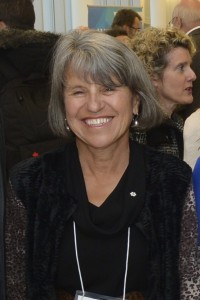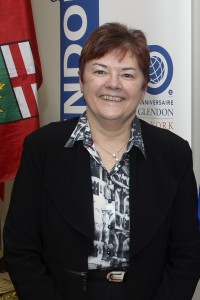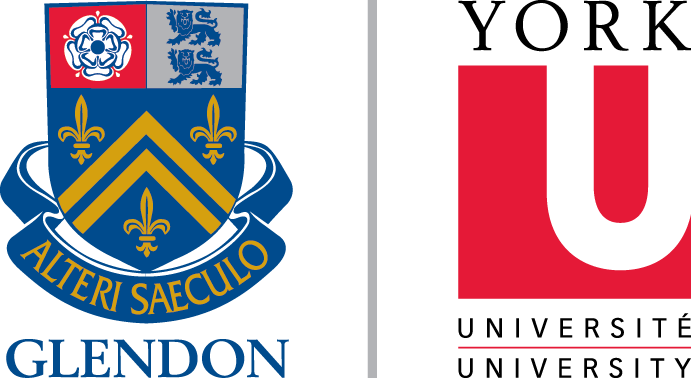
Dyane Adam, Former Glendon Principal

Marie-Lison Fougère, sous-ministre aux Affaires francophones de l’Ontario

Donald Ipperciel, Glendon Principal
“Since English is unavoidable, French has to protect itself,” says Dyane Adam, former Principal of Glendon College, which is York University’s bilingual campus. She was being welcomed, along with an impressive list of speakers, to Glendon’s third Toronto Francophonie Forum.
Over the course of the day, many professionals from the public and private sectors, as well as academics, students or representatives of Francophone organizations walked onto the stage of the auditorium to respond to the same question: Is bilingualism a double-edged sword?
When the discussion concerned the actual value of bilingualism, the answer to this question – a clear “no” – came quickly, with the speakers themselves providing living proof of its value. Bilingualism promotes openness to others and bestows personal and professional opportunities; as such, it is an asset in today’s interconnected and international world.
It is important to note, however, that the term bilingualism has several meanings. And the bilingualism of Canadian identity is not simply a specific added economic, cultural or sociological value that stems from speaking an additional language.
In the case of Canada, we are dealing with English and French, which have official-language status under constitutional law. We are not talking about economic or demographic numbers but about a historical and political fact. Canada is a bilingual country, and French is one of its languages.
This said, we need to ask a different question: what about Canadian bilingualism? And, specifically, what about bilingualism in Toronto, Ontario?
It is interesting to see that Canadian bilingualism has evolved over the years. While there was once a time when French was openly at war with English, this is no longer the case today. Ontario’s French Language Services Commissioner, François Boileau, cited the availability of French-language licence plates. “Thirty years ago they would have caused a hue and cry,” he observed, and then added, “We’re hoping to take the politics out of services in French.”
Academic Raymond Mougeon presented research results to the audience showing how the place of bilingualism has evolved within the community. Whereas a majority of Francophones in the 1970s preferred French for their future careers, the trend nowadays is towards bilingualism.
“It’s a question of opportunities rather than of languages,” announced Nada Benhachim, an international exchange student from Morocco who is currently enrolled at Glendon. English is no longer the enemy.
While English is no longer the enemy, “bilingualism may be the enemy,” noted Marie-Lison Fougère, Deputy Minister of Francophone Affairs. Canada is an officially and legally bilingual country; this is an undeniable fact. But for all Francophones not living in Quebec, Canada is an Anglophone country.
“We must try not be overly optimistic or pessimistic. Assimilation does indeed exist, and our institutions are helping us resist it,” observed Boileau.
Irvin Studin from the University of Toronto told an anecdote that fully symbolized Ontario’s linguistic reality: after completing his French immersion program, he was abandoned by his former Anglophone classmates. They were leaving behind the exoticism of French immersion because “it was time to live in the real world.”
The real world in Ontario is English speaking, and Franco-Ontarians fully understood this fact. Everyone can live in English because public or private services do not have to be provided in both languages; and even when they are, they are sometimes delivered in a way that seems… exotic.
Guy Mignault, Director of the Théâtre français de Toronto and a member of the City of Toronto French Language Advisory Committee, entertained the audience with a story about the battle he had to wage before he was allowed to write a cheque in French. “That’s another reason for sitting on the Committee.”
“There’s one side of the sword that’s sharper than the other. On a personal level, bilingualism brings only benefits; but if you look at institutional bilingualism, it can sometimes represent a decline of the French language,” said Glendon Principal, Daniel Ipperciel, to Le Métropolitain.
Not only was Glendon Campus celebrating its 50th anniversary; it also received an official partial designation as a French-language service provider from Madeleine Meilleur, Minister Responsible for Francophone Affairs – a designation holding great symbolic value for an institution that has stood on such watchful guard over bilingualism.
By Laurence Stenvot – Published in Le Métropolitain, Week of March 30 – April 5, 2016


